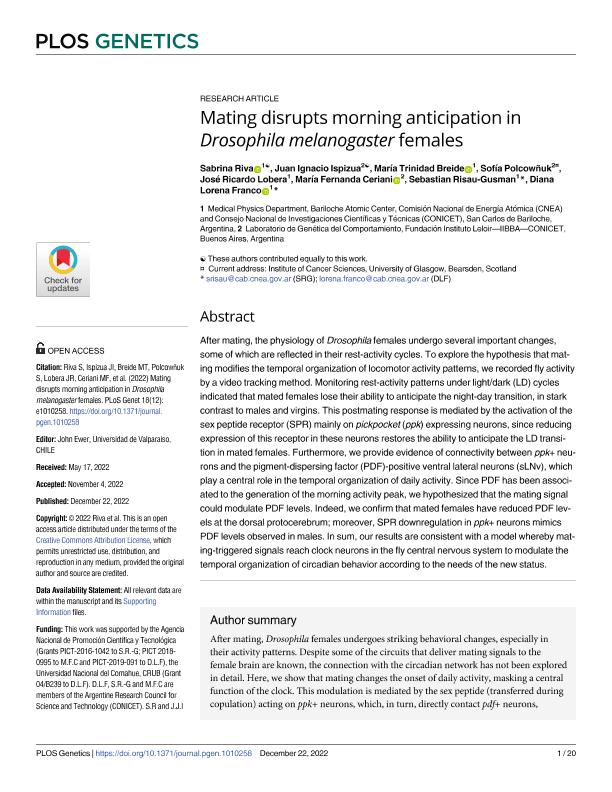Artículo
Mating disrupts morning anticipation in Drosophila melanogaster females
Riva, Sabrina Carla ; Ispizua, Juan Ignacio
; Ispizua, Juan Ignacio ; Breide, María Trinidad; Polcowñuk, Sofía
; Breide, María Trinidad; Polcowñuk, Sofía ; Lobera, José Ricardo; Ceriani, Maria Fernanda
; Lobera, José Ricardo; Ceriani, Maria Fernanda ; Risau Gusman, Sebastian Luis
; Risau Gusman, Sebastian Luis ; Franco, Diana Lorena
; Franco, Diana Lorena
 ; Ispizua, Juan Ignacio
; Ispizua, Juan Ignacio ; Breide, María Trinidad; Polcowñuk, Sofía
; Breide, María Trinidad; Polcowñuk, Sofía ; Lobera, José Ricardo; Ceriani, Maria Fernanda
; Lobera, José Ricardo; Ceriani, Maria Fernanda ; Risau Gusman, Sebastian Luis
; Risau Gusman, Sebastian Luis ; Franco, Diana Lorena
; Franco, Diana Lorena
Fecha de publicación:
12/2022
Editorial:
Public Library of Science
Revista:
Plos Genetics
ISSN:
1553-7390
Idioma:
Inglés
Tipo de recurso:
Artículo publicado
Clasificación temática:
Resumen
After mating, the physiology of Drosophila females undergo several important changes, some of which are reflected in their rest-activity cycles. To explore the hypothesis that mating modifies the temporal organization of locomotor activity patterns, we recorded fly activity by a video tracking method. Monitoring rest-activity patterns under light/dark (LD) cycles indicated that mated females lose their ability to anticipate the night-day transition, in stark contrast to males and virgins. This postmating response is mediated by the activation of the sex peptide receptor (SPR) mainly on pickpocket (ppk) expressing neurons, since reducing expression of this receptor in these neurons restores the ability to anticipate the LD transition in mated females. Furthermore, we provide evidence of connectivity between ppk+ neurons and the pigment-dispersing factor (PDF)-positive ventral lateral neurons (sLNv), which play a central role in the temporal organization of daily activity. Since PDF has been associated to the generation of the morning activity peak, we hypothesized that the mating signal could modulate PDF levels. Indeed, we confirm that mated females have reduced PDF levels at the dorsal protocerebrum; moreover, SPR downregulation in ppk+ neurons mimics PDF levels observed in males. In sum, our results are consistent with a model whereby mating-triggered signals reach clock neurons in the fly central nervous system to modulate the temporal organization of circadian behavior according to the needs of the new status.
Archivos asociados
Licencia
Identificadores
Colecciones
Articulos(CCT - PATAGONIA NORTE)
Articulos de CTRO.CIENTIFICO TECNOL.CONICET - PATAGONIA NORTE
Articulos de CTRO.CIENTIFICO TECNOL.CONICET - PATAGONIA NORTE
Articulos(IIBBA)
Articulos de INST.DE INVEST.BIOQUIMICAS DE BS.AS(I)
Articulos de INST.DE INVEST.BIOQUIMICAS DE BS.AS(I)
Citación
Riva, Sabrina Carla; Ispizua, Juan Ignacio; Breide, María Trinidad; Polcowñuk, Sofía; Lobera, José Ricardo; et al.; Mating disrupts morning anticipation in Drosophila melanogaster females; Public Library of Science; Plos Genetics; 18; 12; 12-2022; 1-20
Compartir
Altmétricas



